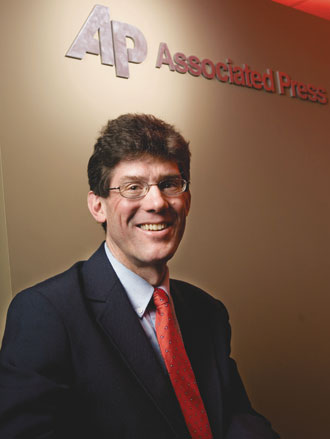 Bloggers at the Table?
Bloggers at the Table?
Downsizing and the departure of veteran reporters hurt news coverage at the state level, where the laws affect our daily lives. But can the Internet fill the gap?
For the past ten years, Andrew Welsh-Huggins '83 has worked for the Associated Press in Columbus, Ohio. Once a statehouse correspondent, he now serves as an enterprise reporter, responsible for trend stories, investigative pieces, campaign coverage, and articles on national issues. This fall, Ohio University Press will publish his book, No Winners Here Tonight, A History of the Death Penalty in Ohio. At Kenyon, Welsh-Huggins majored in classics, which he feels was a good launching pad for a career in journalism. (See his piece, "Homer in the Newsroom," on the Last Page, page 64.)
A lot of news organizations, especially newspapers, have been downsizing lately. Does that have a negative effect on the news that we receive? No doubt. When veteran reporters leave, they take with them an unbelievable amount of knowledge. Every media organization has incredibly brilliant young people working for them, but there are basic things that they don't know that the veteran reporters knew. There is this sense that the Internet can substitute for some of that past knowledge, that you can just look up anything you don't know. I'm not sure that is true.
How has downsizing affected statehouse coverage? I'm not going to say that the overall quality of statehouse coverage has declined, but it is definitely true that it is a lot harder with fewer people covering the news. The state legislature is definitely not any smaller, and it is probably even more powerful. What people forget is that state legislatures really determine how Americans live their lives. What happens at the federal level is important and can have a big impact, but it is the state legislatures that pass the laws that really affect us every day, and that is why it is concerning that there are fewer reporters figuring out what is going on.
Do political blogs fill the gap left by downsizing? We [at Associated Press] definitely read the blogs, because they are often reporting things or talking about things that we should know about. I think you're going to see a bigger debate in the future about bloggers wanting a seat at the table in the coverage of state government. They want to take on some of the credentials and do some of the reporting once done by newspapers.
Do journalists have an obligation to cover more than just the entertainment and sports news that so many Americans seem to crave? I think the obligation is to cover the most important issues to society in the most interesting way. A story about a drunken starlet can be interesting on its face; a story about a presidential debate can be pretty dry. But there is no reason you can't work hard to produce compelling stories about presidential politics. We can't take for granted that just because we think something is important that people will want to read it, and then complain that they choose to read about Britney Spears instead of Barack Obama.
What is lacking intellectually in journalists today? I always encourage students interested in journalism to not get a major in journalism. Just get a degree in whatever subject is fascinating to you, and then do the minimum amount of journalism coursework you need to get a job in reporting. I'm always discouraged that people don't seem to read as much as they used to. They don't have a sense of political history, social history, any history. That is a problem across the board, and I think it is a problem in journalism.
With all the problems facing the journalism business, what will the future be like? The obituary of newspapers and journalism is written pretty much once a day now. My feeling is that the hunger for news and journalism has actually never been greater. What has to happen is that news organizations have to figure out how to feed that appetite and, frankly, make money off it, just like they did for generations with the newspaper. That's the biggest problem. It's not that people getting their news on their cell phone is a bad thing. It is that the financial model is behind, and everyone, including the AP, is trying to figure out what to do next.
Do you have feedback on this page?
